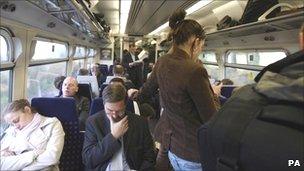Rail overcrowding 'worsening' in London and South East
- Published

Overcrowding on London and south-east England rail routes is getting worse, figures show
Rush-hour overcrowding on London and south-east England rail routes is getting worse, figures have shown.
Morning rush-hour overcrowding is at its worst on services into London Paddington station, the Office of Rail Regulation (ORR) statistics said.
Services into Paddington in the morning peak had an average of 18.5% of passengers standing.
Outside London, Leeds has the highest number of standard-class passengers forced to stand.
First Great Western (FGW) was the train company with the highest levels of overcrowding with 16.6% of people on average standing across the morning and evening peak.
Outside London, Birmingham had the highest passenger demand in the UK, with 36,100 passengers departing from the city during the afternoon peak on a typical weekday in autumn 2010.
This was followed by Manchester with 29,400 departures and Leeds with 23,800.
'Difficult to keep up'
Separate Department for Transport (DfT) figures showed the 10 most overcrowded trains arriving in or departing from London during commuting peak times were all operated by First Great Western (FGW).
The most crowded was the 06:37 BST service from Reading to Paddington, which had a standard-class capacity of 304, but carried up to 610 standard-class passengers.
A FGW spokesman said: "With more and more customers choosing to use our trains into and out of London Paddington it is difficult for us to keep up with demand.
"We are continuing our discussions with the DfT about the clear need for strengthened services into and out of London Paddington."
David Sidebottom, director of rail customer watchdog Passenger Focus, said: "The industry needs to address this through increasing capacity by more trains and carriages, upgrading railway infrastructure such as new signal technology, track work, longer station platforms and new lines."
Rail minister Theresa Villiers said: "We are now embarked on one of the biggest programmes of rail capacity improvement for a hundred years, including more than 2,700 new rail carriages."
A spokesman for the Association of Train Operating Companies said (Atoc) said: "It's good news that the coalition government is investing in over 2,500 new carriages and has pledged to introduce more flexible franchises that will allow operators to respond better to overcrowding."
- Published13 November 2010
- Published9 November 2010
- Published8 October 2010